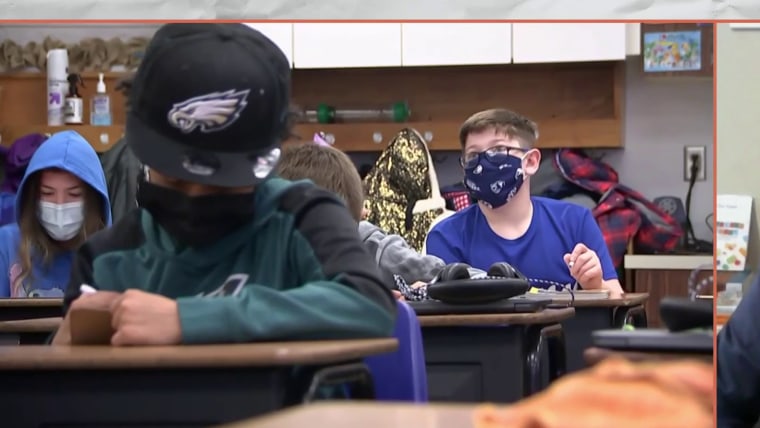The House passed a bill Thursday to extend food assistance measures for children, drawing praise from advocates who said the legislation would help millions of kids get access to meals as inflation makes it increasingly difficult for many parents to make ends meet.
It passed the House in a 376-42 vote. The bill is awaiting a vote in the Senate.
The bipartisan legislation would spare some of the dozens of child nutrition waivers that Congress gave the Agriculture Department the authority to issue. The pandemic-era waivers had been set to expire June 30.
But the new bill, titled the Keep Kids Fed Act, would not extend the most groundbreaking of the federal waivers: one that made school breakfasts and lunches free to all students regardless of their families’ incomes.
Still, anti-hunger advocates expressed relief that an agreement had been reached. The legislation would enable summer meal program providers to operate with more flexibility and help schools in the coming academic year as they continue to cope with supply chain interruptions and labor shortages.
“Even though this bill doesn’t have everything we had hoped and dreamed, it still has a lot,” said Lisa Davis, the senior vice president of the No Kid Hungry campaign at Share Our Strength, a nonprofit organization working to end hunger and poverty. “The most important thing is they are providing relief to those families that are on the edge.”
Crystal FitzSimons, the director of school and out-of-school time programs at the anti-hunger organization Food Research and Action Center, said it was “exciting to have a bipartisan compromise” on child nutrition programs.
“It should be a bipartisan issue,” she said.
Before March 2020, children in families whose incomes were at or below 130% of the federal poverty level were eligible for free school meals, while those in families whose incomes were 130% to 185% of the poverty level were eligible for reduced-price meals through the Agriculture Department’s National School Lunch Program.
The new bill would eliminate reduced-price meals, allowing those who are eligible to get free meals rather than pay 40 cents for lunch and 30 cents for breakfast. Advocates have pushed for that in the past, said Diane Pratt-Heavner, the spokesperson for the School Nutrition Association, a trade organization representing more than 50,000 school nutrition employees.
“Although 40 cents for lunch might not sound like a lot, if you have three kids and you’re trying to get them fed five days a week, that can really add up,” she said, adding that for the 2021-22 school year, a family of four would have had to have earned $34,450 or less to be eligible for free meals or $49,025 or less to have been eligible for reduced-price meals.
Universal school meals removed the need for paperwork to qualify for free or reduced-price meals: For the past two years, all students simply were offered free breakfast and lunch. The adjustment back to filling out applications might come as a surprise, or it might not be properly communicated to families, Davis said.
“I’m really worried about families that may not be aware that they’re going to have to take an affirmative step for their kids to get those meals, and there are kids across the country that will fall through the cracks.”
“As we transition back, I’m really worried about families that may not be aware that they’re going to have to take an affirmative step for their kids to get those meals, and there are kids across the country that will fall through the cracks,” she said.
The Keep Kids Fed Act was a last-minute compromise after the extension for the waivers was excluded from the omnibus spending bill Congress passed this year. Politico reported that Senate Minority Leader Mitch McConnell of Kentucky and other Republicans opposed extending funding for the school meals because of its cost, about $11 billion; an aide to McConnell denied that, saying there was never a proposal for him to reject.
The Keep Kids Fed Act was introduced Tuesday by Sens. Debbie Stabenow, D-Mich., and John Boozman, R-Ark., and Reps. Bobby Scott, D-Va., and Virginia Foxx, R-N.C. It would be paid for by offsets, meaning it is budget-neutral.
“With 90% of our schools still facing challenges as they return to normal operations, this will give our schools and summer meal programs much-needed support to deal with ongoing food service issues. Congress needs to act swiftly to pass this critical help,” Stabenow said in a statement Tuesday urging the passage of the bill.
The flexibility it would extend for summer meal program sites would be a lifeline for many families, advocates said. Among the things it would allow for: Sites could continue to offer grab-and-go meals so parents could take multiple meals for their children at one time, as opposed to having to bring their children back and forth every time to eat meals on site. There would also be fewer geographical restrictions than there would be if the waivers expire.
“Having summer meal sites in communities across the country where families who are struggling are able to easily pick up meals is going to be critical to helping support the household budget, reducing economic stress, reducing the household food budget,” FitzSimons said. “Making sure that these summer meal sites are accessible throughout communities across the country will be a critical support to alleviating the stress that so many families are feeling right now.”
Source: | This article originally belongs to Nbcnews.com











